Publish date:
Comparing Salesforce and ServiceNow is like comparing road bikes to mountain bikes. Salesforce is a comprehensive customer relationship management (CRM) system that also handles specific IT service management tasks. In contrast, ServiceNow focuses solely on IT service management but can also manage customer relationships.
Both Salesforce's Sales Cloud and Service Cloud, along with a ServiceNow developer instance, have their strengths. However, one might be better suited for a specific purpose. To highlight their main differences, I compared these platforms through testing. Here’s what I discovered.
Salesforce vs. ServiceNow at a glance
Salesforce is a standard customer relationship management (CRM) tool that has features for service. ServiceNow is focused on IT service management (ITSM) and shares some functions with a customer relationship management (CRM) system. It means that:
Salesforce is flexible and can help manage some IT tasks, but it is not as strong as dedicated IT service management tools.
ServiceNow is primarily designed for managing IT workflows, making it the industry standard in that area. While it can be used like a CRM, it is not as effective for that purpose.
Quick note: CRM vs. ITSM
Before I proceed, I should define a couple of key terms I'll be using frequently.
-
Customer relationship management (CRM) software enables sales and marketing teams to communicate effectively with customers. It streamlines workflows and ensures leads progress smoothly through the customer journey. While teams use it internally, it also impacts customers by collecting lead information and allowing teams to interact with them through the software.
-
IT service management (ITSM) software enables teams to manage IT processes effectively for businesses and their customers. This software can also cater to customer needs, making it comparable to customer relationship management (CRM) systems.
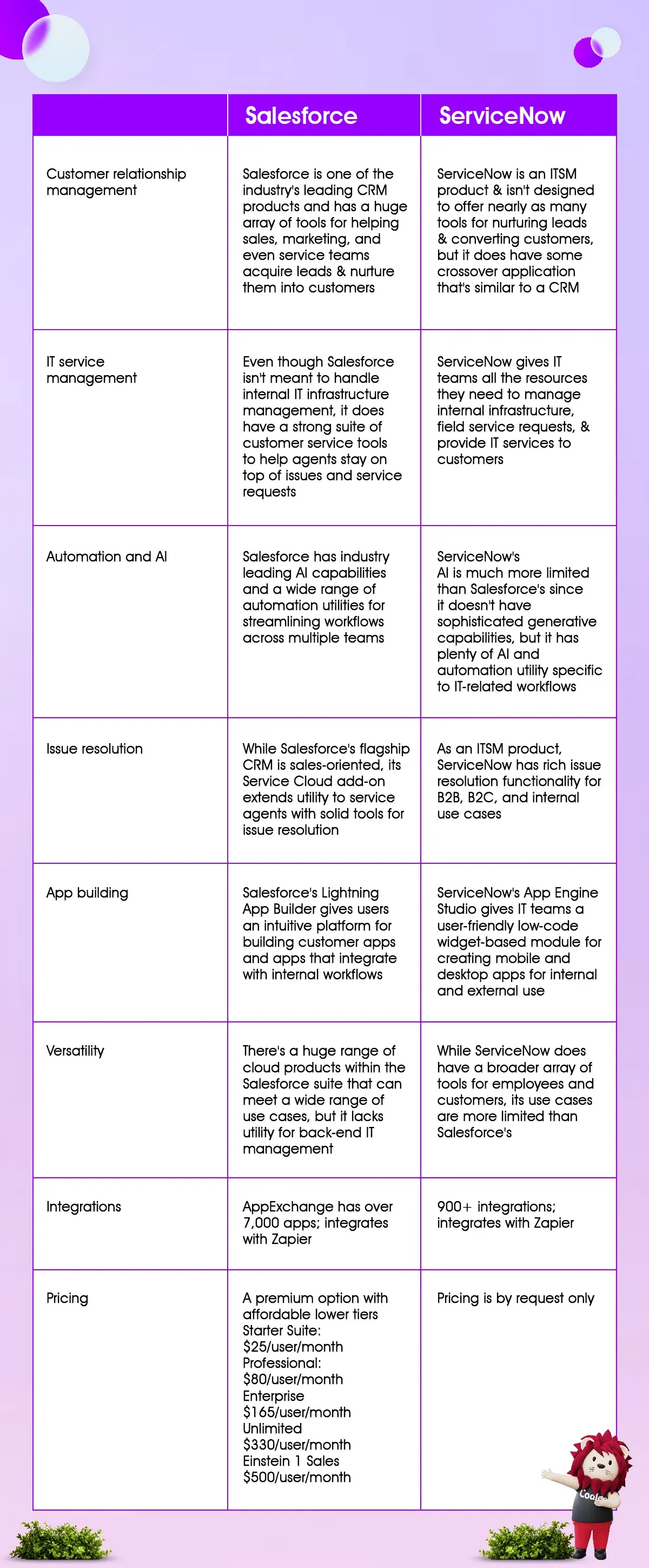
Salesforce is a pure CRM with service capabilities.
It is often challenging to articulate how Salesforce's various cloud products differentiate themselves. The Sales Cloud CRM is the main product I think of when discussing Salesforce, as it’s the one I know best. The Service Cloud is built on top of this CRM and is designed for IT service management. Both the Sales Cloud and Service Cloud have the same price and can be accessed from the same dashboard.
Salesforce's service is fundamentally a CRM, which means it has some capabilities for IT service management (ITSM), but it is mainly designed for sales and customer service teams. It offers features such as automated case management, knowledge management, order management, lead capture, omnichannel communication, and live chat. On the other hand, Sales Cloud focuses more on sales functions, including lead management, contact management, sales pipeline management, lead tracking, and reporting.
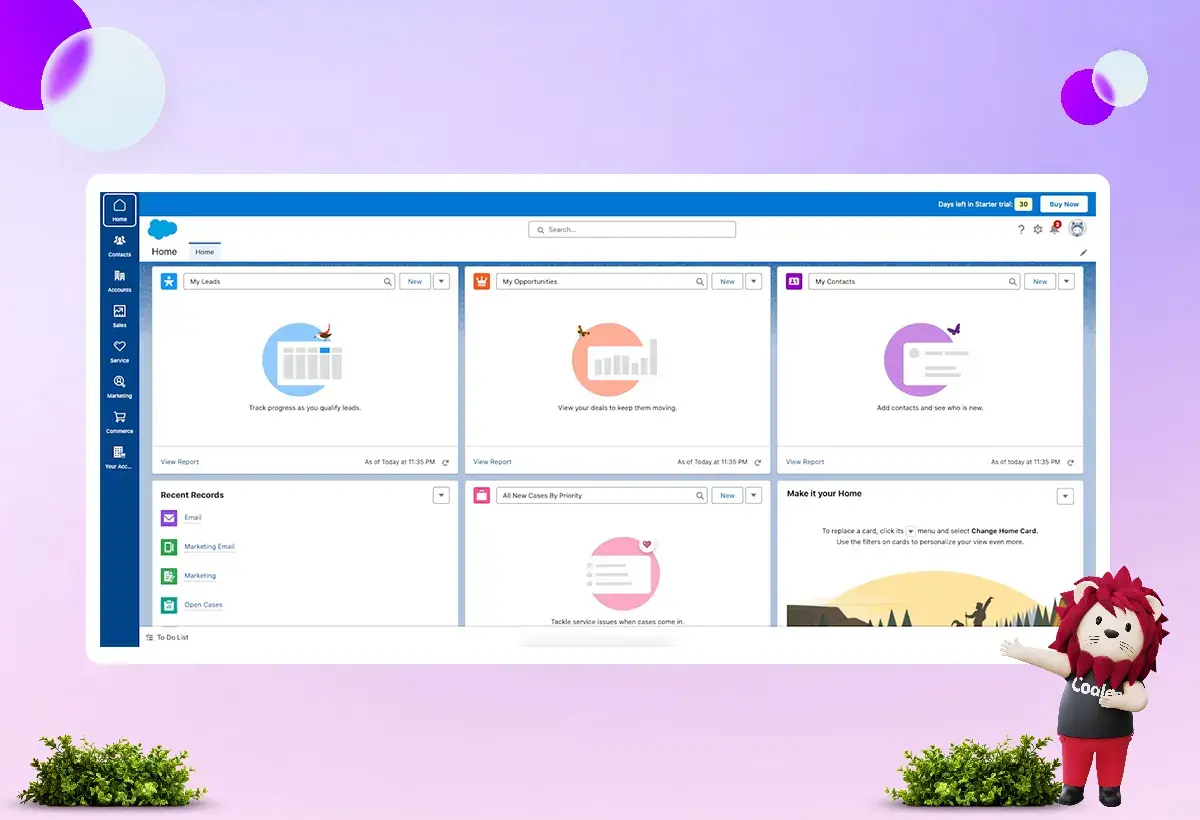
I am including Service Cloud here because it is where Salesforce and ServiceNow share features. Although customer service agents and IT teams handle customer issues and service requests in similar ways, their roles and tools differ significantly.
-
Read Also: What Makes Salesforce the World’s #1 CRM?
ServiceNow is a pure ITSM with some customer relationship capabilities
ServiceNow serves a notably different purpose than Salesforce: it's a pure ITSM. Rather than managing workflows related directly to turning leads into dollar signs, ServiceNow users are concerned with tools for things like privacy and security control, creating and optimizing apps, issue resolution for customers and internal teams, creating portals for customers and employees, automating IT workflows, managing IT-related assets, reporting incidents, and application testing.
Realistically, the goal of an ITSM is fundamentally the same as CRM software: to maximize revenue by streamlining workflows and enhancing customer experience. To that end, some of ServiceNow's tools interface with customers in a similar way to a CRM since IT needs directly affect them (more on that in the next section).
However, the experience of using the software is catered more to handling back-end processes and issue resolution. You won't see modules for leads or as many reporting and forecasting capabilities for metrics like lead conversions and earned revenue, but you will get more focused functionality for issue resolution, downtime/uptime, state, and priority of instance, and all sorts of elements of infrastructure performance.
It's also worth noting that ServiceNow offers an additional suite of products for handling employee, customer, and creator workflows. Similar to how Service Cloud approaches it, but not the same as an ITSM, ServiceNow's Customer Workflows product purports to "go beyond traditional CRM," but it's not quite the same thing. While it does offer customer management tools such as customer profiles, direct email capabilities, agent workspaces, customer self-service, and actionable case flows, it lacks the robust sales pipeline capabilities that a Salesforce-type CRM provides.
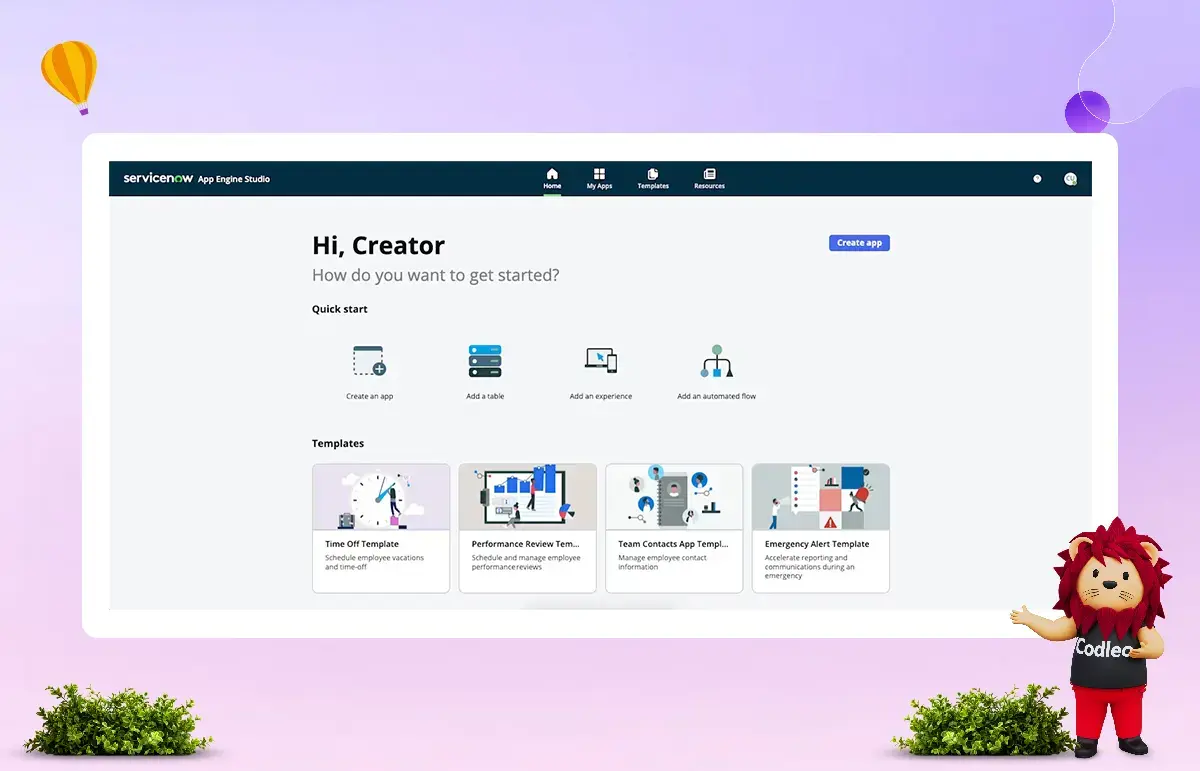
Both apps have powerful automation and integration capabilities
Automation is a key feature of workflow management software, and both Salesforce and similar products offer strong automation tools.
Salesforce focuses its automation tools on lead nurturing and sales tasks. You can create macros to handle everyday actions, set up triggers to automate sequences of actions when leads or agents take specific steps, build intelligent workflows, use machine learning to gain insights into customer behavior and internal processes, and even automatically generate content across channels with its Einstein GPT feature.
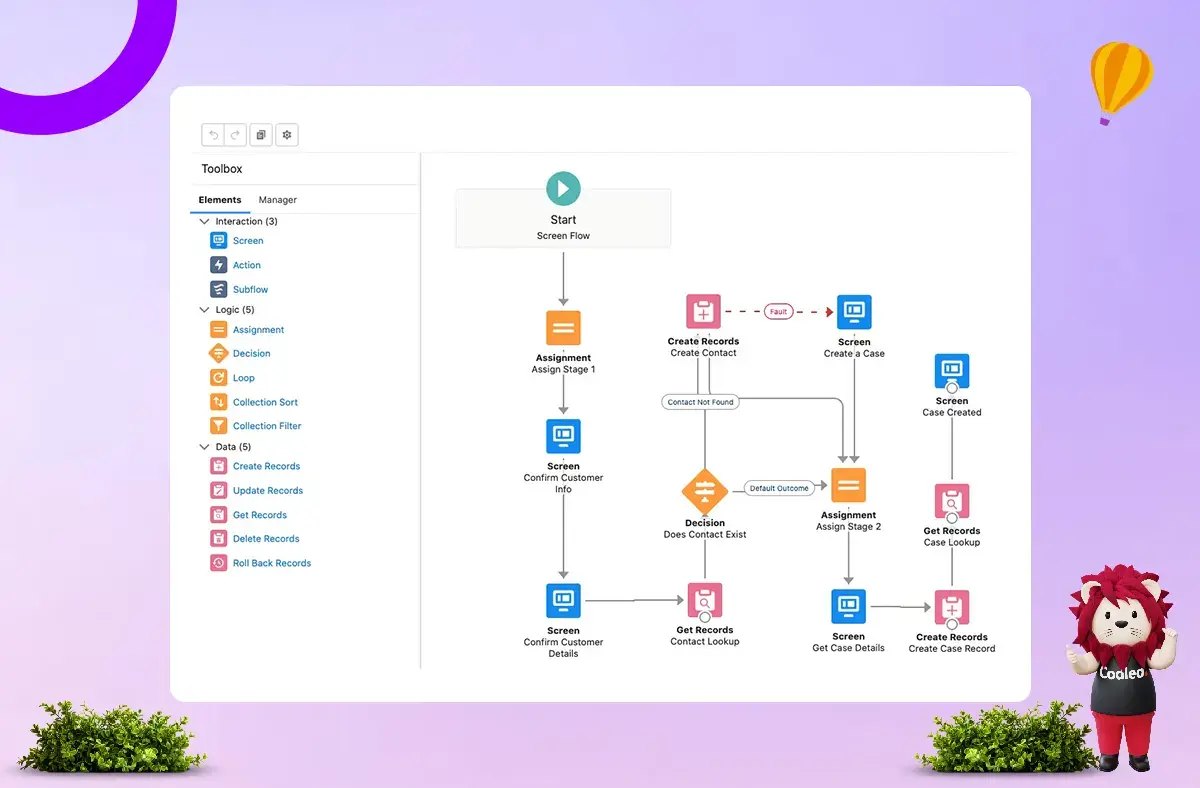
Salesforce automation is available only with basic subscriptions. However, premium packages include Flow Builder, which enables more advanced automation. With Flow Builder, you can create complex trigger sequences, set up scheduled automation, use templates, and take advantage of AI-based automation.
ServiceNow has strong automation features that are similar to those of Salesforce. You can use AI-assisted search for both front-end and back-end users. You can also create no-code automation sequences, receive innovative suggestions for automating workflows, identify opportunities for customer service automation, and set up chatbots through these sequences. The sequence builder offers more complexity and customization than Salesforce’s.
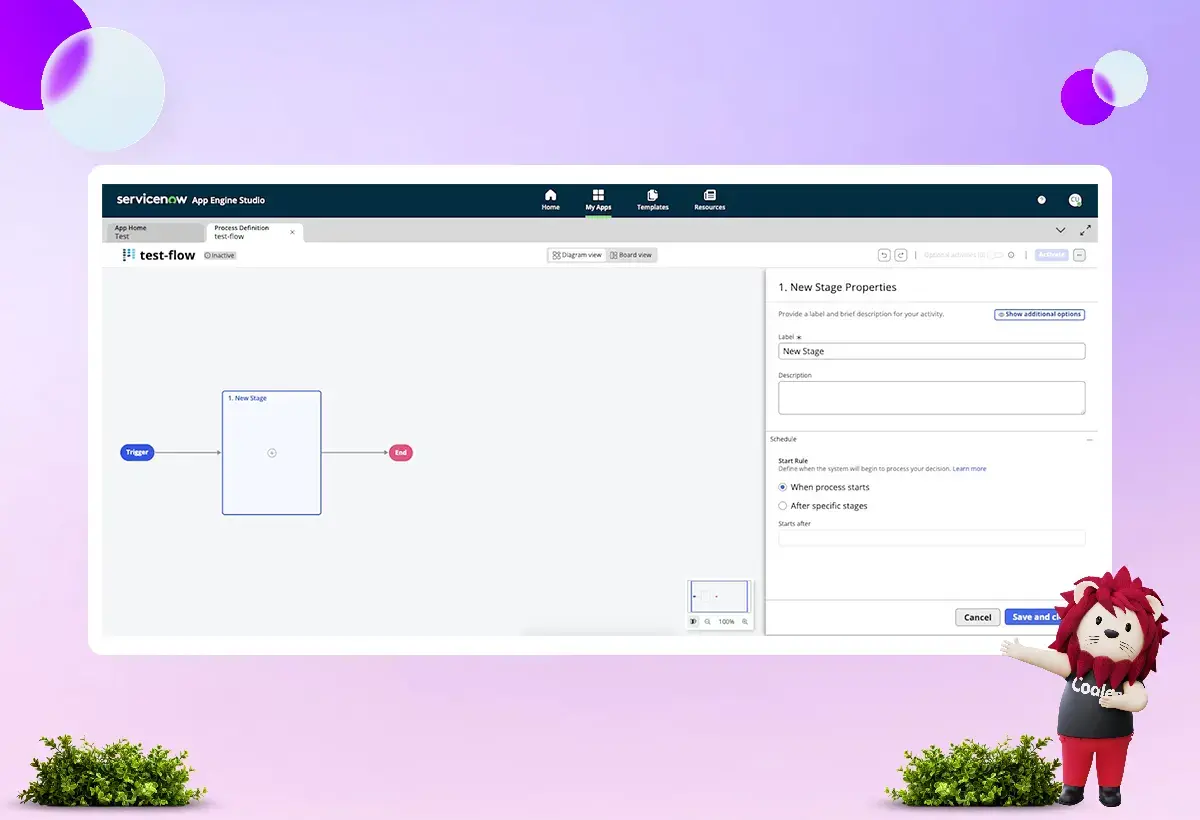
For growing businesses, ServiceNow's Automation Engine provides tools for automation that are easy to scale. You can use a central automation hub to automate tasks such as data capture and directly integrate that data into workflows using AI. It also helps you optimize processes through automation and use robotic process automation where needed.
Salesforce and ServiceNow both offer numerous ways to integrate with other applications. Salesforce offers over 7,000 integrations, while ServiceNow has around 900. They also integrate with Zapier, allowing you to connect them to various tools you use at work. You can send notifications about essential incidents, add leads to your CRM, or connect ServiceNow to Salesforce if you use both. Learn more about automating Salesforce or start with one of the pre-built templates.
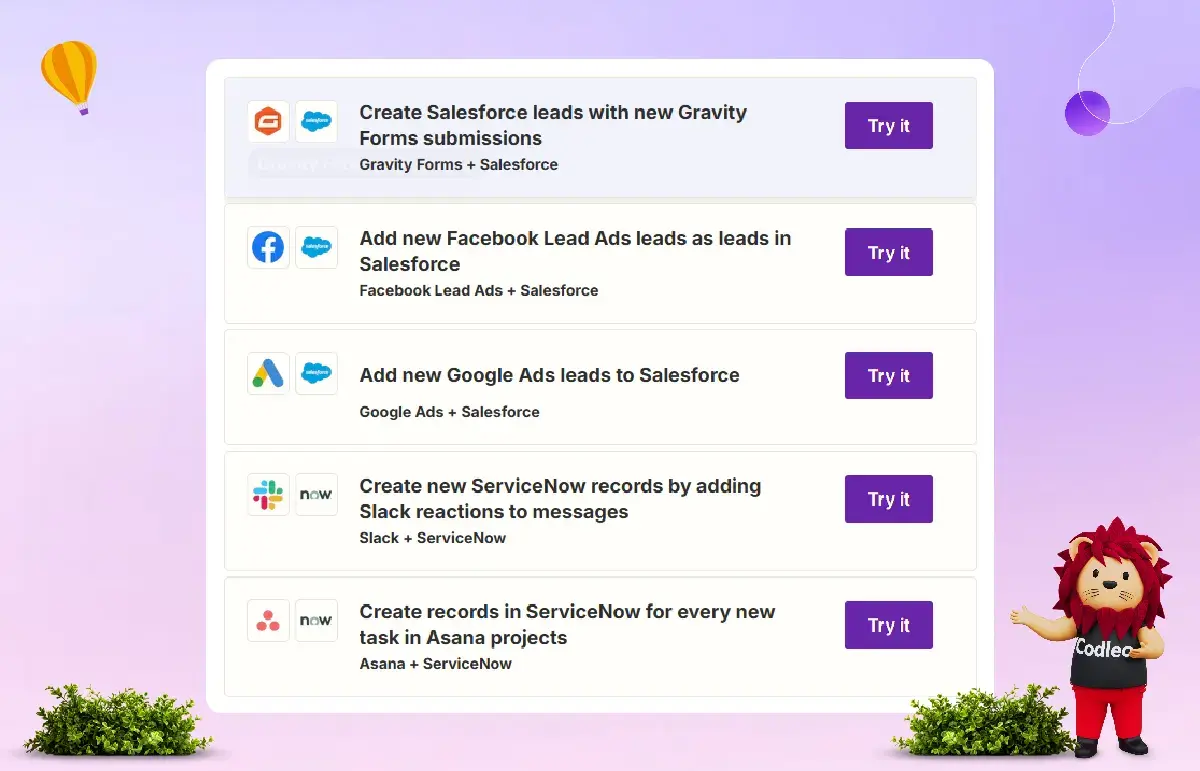
Both tools allow you to build your own apps
Salesforce and ServiceNow allow users to create custom apps. With the Salesforce Einstein 1 Platform, users can build internal apps using existing CRM data. They can also create customer-facing apps using the easy-to-use Lightning App Builder. Internal apps can connect to workflows in the CRM and integrate with Salesforce's AI features.
ServiceNow's App Engine Studio offers a low-code platform for building apps quickly. Its user-friendly interface includes widgets and templates that help beginners create desktop and mobile applications easily. It also works well with many third-party applications using a wide range of APIs. This feature is a valuable tool for IT teams to customize their software solutions, enabling them to serve their teams and customers better.
Both options are suitable for building apps, so this won't be a significant issue if you need that feature. You can also create no-code apps with other tools, like Zapier Interfaces.
ServiceNow is the better platform for issue resolution
Salesforce's central CRM provides tools for service agents to assist customers and resolve issues within the Service module. You can easily contact customers using the built-in messaging feature or through Outlook and Gmail. You can also connect with third-party messaging apps like WhatsApp and Slack. It enables you to automate customer guides with AI and handle common service requests using AI-powered chatbots.
With Salesforce's Service Cloud, you can spend more time updating cases, managing knowledge, tracking incidents, and handling problems and change requests. You can also create reports on key service metrics, such as case lifecycles and solution histories.
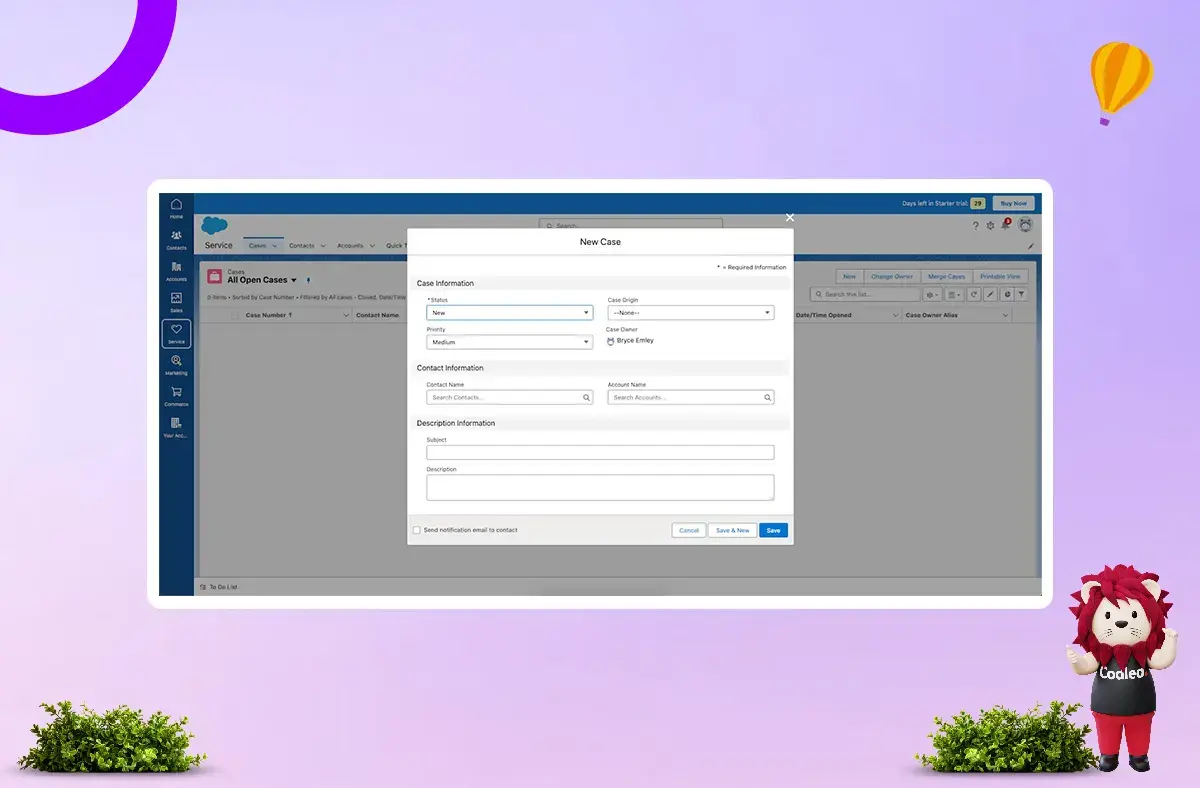
ServiceNow helps users quickly resolve issues and offers many additional features. It enables the automated testing of applications and enhances the management of service levels. It also provides a more integrated chatbot experience, a complete service portal, and an easy-to-use service catalog builder. These tools enable IT teams to resolve current problems more quickly and prevent future issues more effectively.
ServiceNow is a better platform for resolving issues. It is not surprising because, like dogs are better at playing fetch than cats, ServiceNow is designed for this purpose. While cats can play fetch, they are not as well suited for it and may not want to participate.
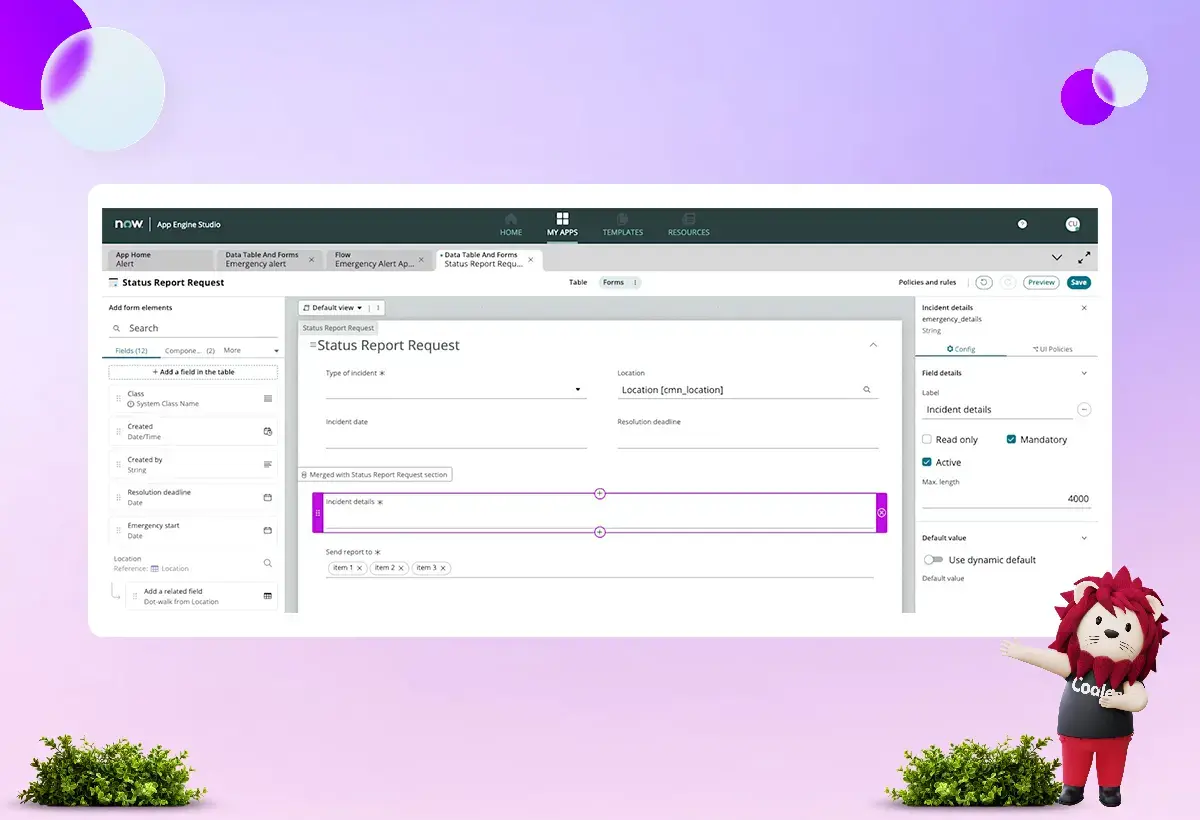
Both have deeply integrated AI catered to their use cases
Salesforce was one of the first customer relationship management (CRM) systems to embrace and utilize artificial intelligence (AI) fully. As you've seen in this comparison, they offer numerous AI features that are integrated into various modules, workflows, and tools.
The Einstein AI assistant helps you create documents, write emails, and summarize issues using OpenAI. You can also use Einstein to build intelligent assistants without coding, get predictions based on user behavior, and automate task scheduling.
Sales and service agents will find many useful features available for $75 a month. These features can be accessed by all users, regardless of their Salesforce usage.
ServiceNow has become a leading platform for integrated AI, although it joined the trend a bit later than others. Its innovative features focus mainly on service and AIOps use cases.
ServiceNow's Now Assist can help in many ways. It can create responses for customers, summarize chat transcripts, and suggest follow-up questions. It also alerts operators with precise, easy-to-understand alert analysis. Additionally, it features AI capabilities that assist with tasks such as human resources management, portfolio management, and field service.
ServiceNow's AI is designed specifically for IT and operations tasks. It utilizes a specialized language model that enables it to comprehend the types of questions ServiceNow users frequently ask.
Salesforce is more flexible than ServiceNow, but ServiceNow can do things that Salesforce cannot.
If you're deciding between these two options, Salesforce excels in IT Service Management (ITSM), while ServiceNow excels in Customer Relationship Management (CRM). In simpler terms, Salesforce is more flexible.
If you sign up for the Professional tier or higher of Service Cloud and add both Einstein 1 Platform and Einstein GPT subscriptions, you can use Salesforce to manage many customer-facing tasks that IT service management (ITSM) usually handles. In contrast, ServiceNow is not well-suited for many functions that Salesforce excels in, such as customer relationship management (CRM).
While you can use Salesforce to automate and manage customer issues, your team won't be able to handle detailed IT tasks, HR tasks, or field service workflows. ServiceNow is also not designed to combine workflows for sales, marketing, and service teams.
In summary, ServiceNow is well-suited for managing tasks and workflows specifically related to IT infrastructure, but its use cases are limited. If you need a complete CRM solution for your team, including service agents, choose Salesforce. If you're looking for IT service management and are satisfied with a CRM alternative to Salesforce, consider ServiceNow.
Competitor Space
Salesforce and ServiceNow have been competing for some time, but the real competition intensified when ServiceNow announced its entry into the CRM market.
ServiceNow now offers features such as support across multiple channels, self-service options, case management, and conversational intelligence. It provides a complete view of customers, similar to what Salesforce Service Cloud offers.
It's still too early to gauge how competitive ServiceNow will be in the CRM market, particularly against established companies like Salesforce and Oracle. However, the CRM market is limited, and ServiceNow is growing at a rate of 20% per year, while Salesforce is growing at a rate of 8%. ServiceNow may capitalize on its opportunities.
ServiceNow CEO Bill McDermott recently mentioned that ServiceNow and Microsoft are strengthening their partnership to bring changes to the CRM market. This update was shared during the company's Q4 earnings call.
"This is a great time to remind you that ServiceNow's CRM and industry workflows are proliferating," he said. "We have a good reason for this: ServiceNow can take action and fully automate workflows across the organization. We sell, fulfill, and service everything on one platform, with one design and one data model."
What Are the Challenges?
Salesforce will likely face significant challenges as it starts this new venture.
Salesforce's recent move is bold, but it may be too late. ServiceNow has been the leading player in IT service management (ITSM) for years and has strong ties to IT operations. It makes it hard for Salesforce to enter the market.
Salesforce needs to carefully consider how they can meet customer needs in this area. They should consider their unique selling points (USPs) and relevant use cases.
IT Service Management (ITSM) requires specialized knowledge about IT. Unlike Customer Relationship Management (CRM), IT Service Management (ITSM) requires strong skills in IT operations and security. It is a new focus for Salesforce, and they do not yet have a strong reputation in this field.
However, there is no guarantee that Salesforce won’t be able to find the resources to accomplish this – it’s simply a matter of finding the right approach that offers customers something ServiceNow doesn’t. They also have previous experience expanding into new spaces, having acquired MuleSoft and Marketing Cloud (Tableau) while also developing Data Cloud organically.
What Does This Mean for ServiceNow?
Right now, ServiceNow does not have many concerns. The company leads the IT service management (ITSM) market with a market share of over 50% and is a respected name in this field. However, since Salesforce is a powerful and influential competitor, ServiceNow is likely watching closely to see what Salesforce does next.
Salesforce's move into customer relationship management (CRM) suggests that it is expanding into larger areas, so ServiceNow likely has a growth strategy already in place.
How Do the Stakes Look?
In the competition between cloud solutions, it's clear which platforms are stronger based on their industry capabilities and reputations. But which one will succeed?
We should encourage the merging of IT Service Management (ITSM) and Customer Relationship Management (CRM). This trend can help many businesses and customers. It relies on the growth of AI-driven automation and can lead to better collaboration between IT, customer service, and business operations.
Salesforce vs. ServiceNow: Which is best for you?
It is now clear that Salesforce and ServiceNow serve different purposes. To wrap it up for anyone who is still unsure about the differences between these two products, here is my conclusion:
-
To manage workflows between teams that nurture leads and interact with customers, use Salesforce. It is the best option.
-
ServiceNow is the best choice for improving workflows in back-end IT operations and managing IT infrastructure for both internal teams and customers.
-
Whether you choose CRM or ITSM, Zapier can connect your preferred software to many other applications. It helps you automate workflows without coding, benefiting sales, marketing, and IT teams.
Conclusion
ServiceNow and Salesforce are two leading cloud platforms that serve different purposes for businesses. ServiceNow is excellent for managing IT services. Salesforce is best for handling customer relationships. Choosing the right platform depends on your business's specific needs and priorities.
Do you want to optimize your IT infrastructure and enhance service delivery? If so, consider ServiceNow. It offers a complete set of IT service management tools that help automate tasks. If you want to improve customer connections, check out Salesforce’s CRM. It includes the Service Cloud, which is recognized for enhancing the customer experience.
When deciding between ServiceNow and Salesforce, focus on what your business needs. Consider your industry and the challenges you aim to address. By carefully comparing ServiceNow and Salesforce, you can determine which one aligns better with your organization’s goals.
Read Also: SIGNS YOUR BUSINESS NEEDS A SALESFORCE SUPPORT AND MAINTENANCE PARTNER
Still unsure if Salesforce is the right choice for your business? Let our certified experts guide you. At Codleo, we offer personalized Salesforce consulting services that help you align CRM strategies with tangible business outcomes. Whether you're migrating from another platform or starting from scratch, we ensure a seamless transition tailored to your goals.
Schedule your free consultation today and discover how Salesforce can unlock growth for your team.
FAQ
ServiceNow helps organizations manage their IT services and operations. It also automates business processes.
ServiceNow mainly manages IT services and operations. It also helps businesses automate tasks.
ServiceNow and Salesforce serve different purposes. ServiceNow helps manage IT services and automates tasks. Salesforce focuses on managing customer relationships.
Both systems can handle customer service, but they do it in different ways. Salesforce is good at managing relationships. ServiceNow is better for handling IT services and automating tasks.
ServiceNow helps organizations manage their IT operations. It allows them to automate and improve IT tasks. Its main features include managing incidents, problems, changes, and service requests.
Both companies utilize automation and AI to enhance their workflows. Salesforce helps with sales, marketing, and customer service processes. ServiceNow focuses on automating IT services and business workflows.
Both platforms allow you to customize and integrate them to meet your needs. Salesforce is well-known for its AppExchange and strong customization options. ServiceNow also offers numerous ways to integrate and customize solutions to meet various business needs.
Salesforce and ServiceNow offer various pricing and licensing options to meet different business needs. Companies select the option that best aligns with their specific goals.
Choosing between ServiceNow and Salesforce depends on your business needs. Utilize ServiceNow for robust IT support and comprehensive automation. Choose Salesforce if you want to manage customer relationships.















